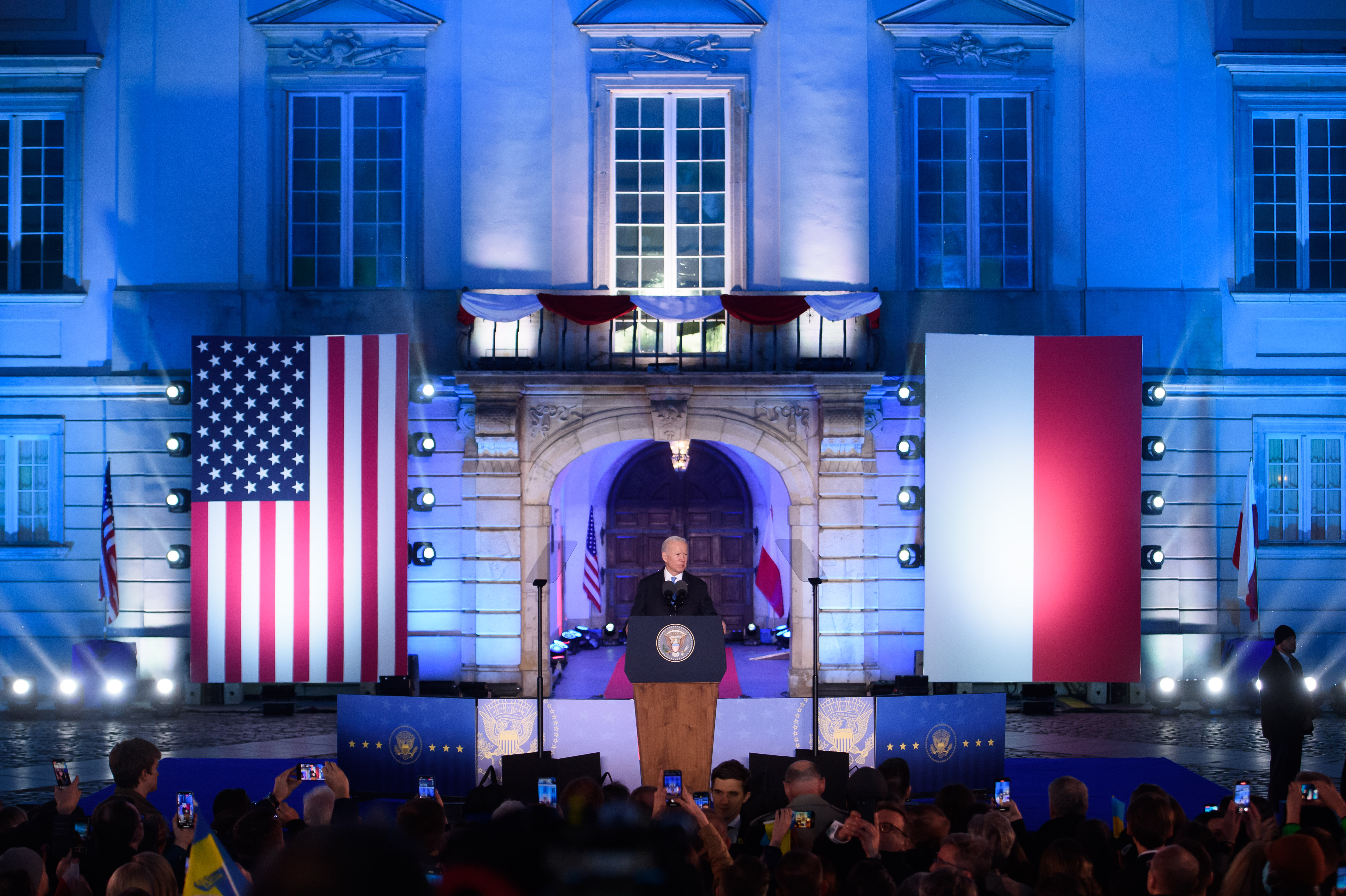President Joe Biden's Visit to Poland
On 25-26 March, U.S. President Joe Biden paid a working visit to Poland. The key element of his trip was a speech he delivered in Warsaw in which he emphasised the U.S. readiness to fulfil its allied obligations and recalled the concept of American leadership in defence of the international rules-based order. The U.S. focus on the security situation on NATO’s Eastern Flank, in particular the strengthening of the Alliance military presence and rearming Ukraine, does not change the main thrust of American foreign policy, which is the competition with China.
 Zbyszek Kaczmarek/ Gazeta Polska/ FORUM
Zbyszek Kaczmarek/ Gazeta Polska/ FORUM
What were Biden’s goals and immediate results of his visit?
The overriding purpose of President Biden’s visit was to convey the message of NATO unity. Biden emphasised the American readiness for collective defence and reaffirmed the broad U.S. support for Ukraine in its fight against Russia. The visit was also used to express the commitment of the United States to the territorial integrity and sovereignty of Ukraine. Polish-American consultations concerning, among others, bilateral military and energy cooperation did not bring any visible changes in these areas. An important message sent by the Polish authorities to the administration was the need to accelerate procurement procedures for selling American-made weapons to Poland. The visit strengthened the perception of Poland as the most important U.S. partner on NATO’s Eastern Flank, which also was confirmed by President Biden’s focus on the situation of refugees from Ukraine and the humanitarian aid provided by the Polish people. Biden’s words that echoed the widest might have suggested a U.S. demand that the Russian people remove Vladimir Putin from power, although afterwards the White House rejected this interpretation of the president’s remarks.
What does Biden’s visit mean for American policy towards Poland and other European allies?
President Biden’s main message to the G7, NATO and EU summits, as well as during the meetings in Poland, was the idea that without concerted policy of U.S. and European countries, and absent their joint action, the defence of the Western world against revisionism of the world order by authoritarian regimes cannot be effective. This idea was included in Biden’s speech in Warsaw, which portrayed a Russia steeped in authoritarianism. It seems that the president wanted to emphasise the historic change in the political position of Europe—together with the U.S.—to oppose Russia, mainly by making it independent of fossil fuel supplies from that country and by strengthening democratic institutions. Pointing to the long-lasting confrontation between the community of democratic states and authoritarian regimes, Biden also seemingly referred to the necessity of close cooperation between Europe and the U.S. in competing with China. With his presence in Rzeszów, near the Polish-Ukrainian border (not far from Lviv where, on the same day, Russian missiles struck the city), Biden also wanted to emphasise the U.S. commitment to the obligations contained in Art. 5 of the Washington Treaty.
What is the U.S. domestic context of Biden’s journey to NATO’s Eastern Flank?
Russia’s invasion of Ukraine and Biden’s trip to Europe coincided with a gradual decline in U.S. public support for the president and his administration (according to the Rasmussen survey of 28 March, Biden had a 43% approval rating). This drop since his inauguration is mainly due to inflation and the rising costs of living. By leading over the actions of Western states in response to the Russian invasion, Biden has established himself as a strong leader who can successfully counter autocratic regimes that seek to undermine the international rules-based order, including on human rights. This was the implementation of one of Biden’s main foreign policy goals—along with the competition with China—announced during the campaign for the presidency. Polls in the U.S. show strong approval for supporting Ukraine, in particular refugees, and accepting them into the U.S. (in the Ipsos poll of 18 March, 71% of respondents were in favour). More than half of the respondents also believe that the administration is effectively helping Ukraine (although 58% support avoiding direct military confrontation between the U.S. and Russia). However, before the midterm elections this November, economic issues will be more important for voters than Biden’s role in international politics. Therefore, the president cannot count on Ukraine policy bringing a significant improvement in his polling or a strengthening of the chances of the Democratic Party’s victory in the upcoming elections, which are still fairly poor.
How does the security situation in Europe affect the global goals of U.S. policy?
The message regarding the necessity of strengthening the defence capabilities of U.S. allies in Europe and NATO, -in addition to deterring Russia, is also connected with the administration’s continued belief in the inevitability of a deeper U.S.-Chinese confrontation. Due to the scale of the increase in China’s military potential in the Indo-Pacific, the U.S. will have to return to strengthening its position in this region in the near future. There are strong opinions in the U.S that this requires a reduction in military involvement in Europe. Although in conditions of a persistent Russian threat, it is unlikely that the U.S. will decide to withdraw from strengthening its military presence on the Eastern Flank. It is in Poland’s interest to use the American focus on the situation in Europe to quickly and effectively establish a new framework for allied deterrence and defence against Russia. The main element could be the permanent presence of U.S. forces in Poland.


